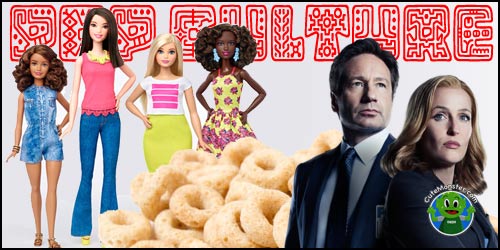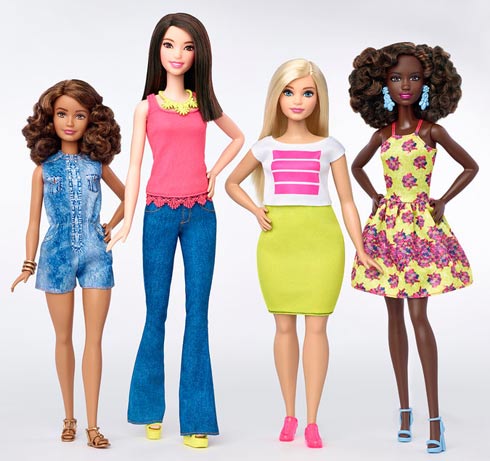
2016 continues to be an unusual year. Recycling has extended to television shows such as The X-Files. Mattel, after 57 years of producing an iconic yet laughably proportioned female body type for Barbie, decides to release 3 realistic ones. And General Mills’ stalwart Cheerios cereal has succumbed to pressure joining the gluten-free bandwagon. To the outside observer, these developments seem reactionary and frankly, quite trivial in scope. Yet I see it as glaring microcosm of a growing cultural shift. Namely, the internet shaping society rather than organic human interaction.
I loved The X-Files in the 1990s. Producer/Writer Chris Carter tapped into an era of uncertainty and distrust that spoke to the disaffected youth of generation X (including yours truly). David Duchovny’s portrayal of FBI agent Fox Mulder epitomized the anti-establishment hero seeking to uncover hidden truths. Gillian Anderson, portraying the scientifically minded FBI agent Dana Sculley, balanced the duo by keeping Mulder focused in his pursuits. The stories were filled with alien conspiracies, shadow governments, intrigue, humor, existential questions, occasional monsters (both human and non-human), as well as a series long romantic tension. The X-Files peaked with a theatrically released movie in 1998. Yet the show faded to oblivion in 2002. In 2015, a grass roots social media campaign began stoking the fires for a return of the series. The enormous groundswell inspired the original creative team plus the cast to produce a limited 6 episode run for 2016. I’ve seen the first two episodes and thankfully found them to be true to the original style of the show while embracing modern technology and sensibilities. Mulder and Sculley both carry the emotional scars they’ve experienced in their lives together. The truth they seek, once distant in an almost clinical sense, has become personal.
Mattel’s Barbie doll literally spans generations. If you were a girl or boy growing up in the United States over the last 60 years, a Barbie doll was likely directly or indirectly a part of your toy playing experience. Although the Barbie toy universe expanded in terms of race, hairstyles, and clothing, the female doll’s body type did not. She was proportioned in a way that could give even a supermodel a body image complex. Over the years many groups have been critical of Mattel for not producing a more realistic body type. Yet the profits continued to roll in for one of its best selling toys despite the backlash. Social Media elevated the issue on an entirely different scale. Millions voiced their opposition which eventually curbed Barbie sales. Mattel blinked ushering in three new body types to join the original Barbie in 2016.

 “The one and only Cheerios” was a ubiquitous advertising jingle that happened to sum up my lifelong cereal eating experience. As a kid, I indulged in an abundance of sugar laden cereals with my dentist being the main beneficiary. Cheerios, on the other hand, was the healthier option—one that I’d pass on to my own children. In fact it became an essential snack food when my kids first grew in their baby teeth. New parent tip: be sure to ration the amount of cereal given to your child. If you put a full cereal bowl of Cheerios in front of a one year old I assure you she/he will test out the theory of gravity. A lot.
“The one and only Cheerios” was a ubiquitous advertising jingle that happened to sum up my lifelong cereal eating experience. As a kid, I indulged in an abundance of sugar laden cereals with my dentist being the main beneficiary. Cheerios, on the other hand, was the healthier option—one that I’d pass on to my own children. In fact it became an essential snack food when my kids first grew in their baby teeth. New parent tip: be sure to ration the amount of cereal given to your child. If you put a full cereal bowl of Cheerios in front of a one year old I assure you she/he will test out the theory of gravity. A lot.
Recently, doctors have widely acknowledged the condition of gluten sensitivity which results in symptoms like diarrhea, stomach upset, abdominal pain, and bloating. Gluten is found in grains such as wheat, barley, rye, as well as a cross between wheat and rye called triticale. Prompted by the awareness consumers gained via the internet and social media, General Mills now makes gluten-free Cheerios as a standard practice. As always, consulting one’s doctor before a change in diet is recommended.
Information continues to be readily available in the internet age and will only increase exponentially worldwide. The intersection between digital and real life grows blurrier with each technological advance. Seemingly inconsequential developments offer up a snapshot of the state of society. Recognizing change in real time may form the foundation for a better tomorrow.
What are your thoughts? Any new developments in pop culture, science, etc. catch your attention lately?




